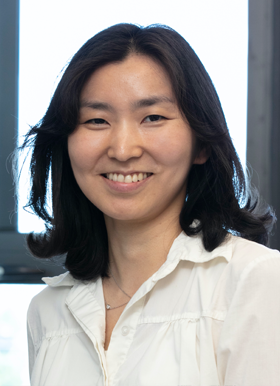
Yoon-A Kang, PhD
Assistant Professor
- Phone: 314-273-5954
- Fax: 314-273-5991
- Email: yoonakang@nospam.wustl.edu
Address:
- Hematology Division
Mail Stop 8125-0020-08, Washington University, 660 South Euclid Avenue, St. Louis, MO 63110 (mail) - Room 8832A, Clinical Sciences Research Building (office)
- Room 8832, Clinical Sciences Research Building (lab)
Research Interest: Hematopoietic stem cells; Multipotent progenitor; Cell fate decision; Lineage specification; Myeloid Malignancy; Aging
Research: The ability of cells to adapt and make fate choices in response to intrinsic and extrinsic cues is a fundamental question in biology that has deeply fascinated me. My research interests are decoding the regulatory mechanisms underlying cell fate decision and lineage specification in hematopoietic stem cells and multipotent progenitor populations. My laboratory uses genetic mouse models, omics approaches (e.g., single cell analysis, bulk sequencing, secretome analysis, etc.), multi-color flow cytometry, and various cellular and molecular techniques as primary tools. The ultimate goal of my research is modulating lineage output for therapeutic purposes in disease and aging contexts.
For more information, please see Kang Lab
Biosketch
Education
- 2021-2017: Postdoctoral Fellow, Laboratory of Dr. Emmanuelle Passegue, Columbia Stem Cell Initiative, Columbia University, New York, NY
- 2017-2013: Postdoctoral Fellow, Laboratory of Dr. Emmanuelle Passegue, Department of Medicine, University of California-San Francisco, San Francisco, CA
- 2013: PhD in Cellular and Molecular Biology, University of Wisconsin-Madison, WI
- 2006: MSc in Cancer Biology, Yonsei University, Seoul, Korea
- 2004: BS in Biology, Yonsei University, Seoul, Korea
Academic Positions & Employment
- 2021-present: Assistant Professor, Department of Medicine, Hematology Division, Washington University in St. Louis, St. Louis, MO
Honors & Awards
- 2025: Siteman Investment Program Research Development Award
- 2024: American Cancer Society Catalyst Award
- 2022: Leukemia Research Foundation New Investigator Award
- 2021: NIH/NIDDK K01 Research Scientist Development Award
- 2021: FASEB’s Hematologic Malignancies Conference Outstanding Abstract Award
- 2021: International Society for Experimental Hematology Virtual Travel Grant Award
- 2020: International Society for Experimental Hematology Virtual Travel Grant Award
- 2019-2017: Leukemia and Lymphoma Society Career Development Program Grant (Special Fellow)
- 2017: International Society for Experimental Hematology Travel Grant Award
- 2016-2015: UCSF Program for Breakthrough Biomedical Research Postdoctoral Research Award
- 2012: American Society of Hematology Abstract Achievement Award
- 2012: CMB Travel Award, University of Wisconsin-Madison
- 2013-2011: American Heart Association Predoctoral Fellowship
- 2006-2004: Brain Korea 21 Project Scholarship, Ministry of Education and Human Resources Development, Republic of Korea
- 2002: High Honors Student, Yonsei University
- 2001: Yonsei Scholarship, Yonsei University
Selected Publications
- Secretory MPP3 Reinforce Myeloid Differentiation Trajectory and Amplify Myeloid Cell Production
Kang YA, Paik H, Zhang SY, Chen JJ, Olson OC, Mitchell CA, Collins A, Swann JW, Warr MR, Fan R, Passegue E
J Exp Med 2023 Aug 7;220(8):e20230088 - Deregulated Notch and Wnt Signaling Activates Early-Stage Myeloid Regeneration Pathways in Leukemia
Kang YA, Pietras EM, Passegue E
J Exp Med 2020 Mar 2;217(3):e20190787 - Functionally Distinct Subsets of Lineage-Biased Multipotent Progenitors Control Blood Production in Normal and Regenerative Conditions
Pietras EM, Reynaud D, Kang YA, Carlin D, Calero-Nieto FJ, Leavitt AD, Stuart JM, Gottgens B, Passegue E
Cell Stem Cell 2015 Jul 2;17(1):35-46 - The Exosome Complex Establishes a Barricade to Erythroid Maturation
McIver SC*, Kang YA*, DeVilbiss AW, O’Driscoll CA, Ouellette JN, Pope NJ, Camprecios G, Chang CJ, Yang D, Bouhassira EE, Ghaffari S, Bresnick EH (*Equal contribution)
Blood 2014 Oct 2;124(14):2285-97 - Autophagy Driven by a Master Regulator of Hematopoiesis
Kang YA, Sanalkumar R, O’Geen H, Linnemann AK, Chang CJ, Bouhassira EE, Farnham PJ, Keles S, Bresnick EH
Mol Cell Biol 2012 Jan;32(1):226-39